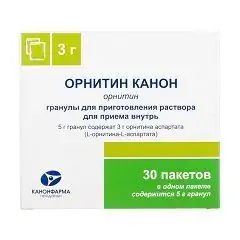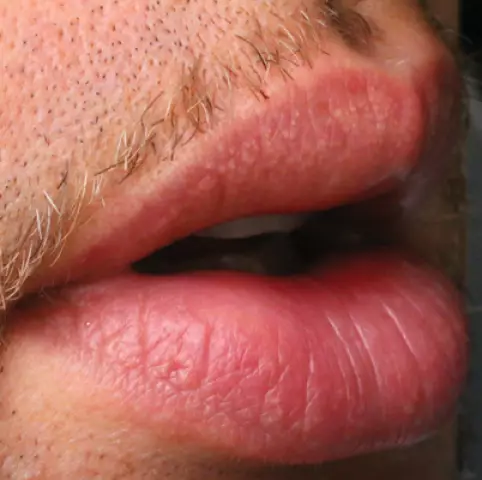- Author Rachel Wainwright wainwright@abchealthonline.com.
- Public 2023-12-15 07:39.
- Last modified 2025-11-02 20:14.
Ornithine Canon
Ornithine Canon: instructions for use and reviews
- 1. Release form and composition
- 2. Pharmacological properties
- 3. Indications for use
- 4. Contraindications
- 5. Method of application and dosage
- 6. Side effects
- 7. Overdose
- 8. Special instructions
- 9. Application during pregnancy and lactation
- 10. Use in childhood
- 11. In case of impaired renal function
- 12. Drug interactions
- 13. Analogs
- 14. Terms and conditions of storage
- 15. Terms of dispensing from pharmacies
- 16. Reviews
- 17. Price in pharmacies
Latin name: Ornitin Canon
ATX code: A05BA06
Active ingredient: ornithine (Ornithinum)
Producer: Kanonpharma production, CJSC (Russia)
Description and photo update: 2019-23-10
Prices in pharmacies: from 1280 rubles.
Buy

Ornithine Canon is a hypoazotemic drug.
Release form and composition
Dosage form - granules for the preparation of a solution for oral administration: white with a yellowish tinge or almost white mixture of granules and powder with the smell of mint and lemon (in a cardboard box 10 or 30 bags of a combined material containing 5 g of granules each, and instructions for the use of Ornithine Canon).
1 bag of granules contains:
- active substance: L-ornithine-L-aspartate - 3 g;
- auxiliary components: mannitol - 1.43 g; anhydrous citric acid - 0.5 g; aspartame - 0.05 g; mint flavor - 0.005 g; lemon flavor - 0.015 g.
Pharmacological properties
Pharmacodynamics
L-Ornithine-L-Aspartate has a detoxifying effect by reducing the increased level of ammonia in the body, including against the background of liver pathologies. The action of the drug is due to its participation in the ornithine cycle of Krebs urea formation (restoring the activity of ornithinecarbamoyltransferase and carbamoylphosphate synthase, it activates the cycle).
The use of L-ornithine-L-aspartate promotes the production of growth hormone and insulin. For diseases in which the patient requires parenteral nutrition, the drug improves protein metabolism. In cases of steatosis and steatohepatitis, Ornithine Canon therapy serves to normalize increased body weight, as well as reduce pain, dyspeptic and asthenic syndromes.
Pharmacokinetics
The action of L-ornithine-L-aspartate begins 15-25 minutes after ingestion. The drug quickly dissociates into its constituent components - aspartate and ornithine. Its half-life is short. Excretion is carried out through the urea cycle, with urine.
Indications for use
- acute and chronic liver pathologies, accompanied by hyperammonemia;
- latent and severe hepatic encephalopathy;
- steatohepatitis and steatosis of various origins.
Contraindications
Absolute:
- severe renal failure (creatinine clearance more than 3 mg per 100 ml);
- period of breastfeeding;
- children under the age of 18;
- individual intolerance to the components of the drug.
With care, under medical supervision, Ornithine Canon granules are prescribed during pregnancy.
Ornithine Canon, instructions for use: method and dosage
The solution prepared from Ornithine Kanon granules is taken orally, after meals. Immediately before use, the contents of 1-2 sachets are dissolved in 0.2 l of liquid.
Frequency rate of drug intake - 2-3 times a day. The duration of the course of therapy is set by the doctor on an individual basis, depending on the severity of the disease.
Side effects
Possible adverse reactions (> 10% - very common;> 1% and 0.1% and 0.01% and <0.1% - rarely; <0.01%, including individual messages, - very rare; cases when frequency cannot be calculated from available data - frequency is unknown):
- immune system: frequency unknown - allergic reactions;
- gastrointestinal tract: infrequently - diarrhea, flatulence, abdominal pain, nausea, vomiting;
- musculoskeletal and connective tissue: very rare - pain in the limbs.
Overdose
The main symptoms: increased severity of adverse events.
Therapy: gastric lavage, the appointment of activated carbon, symptomatic treatment.
special instructions
Before starting therapy with Ornithine Canon, it is important to consult your doctor regarding the dosage regimen and the duration of the course of treatment.
Influence on the ability to drive vehicles and complex mechanisms
Patients with hepatic encephalopathy resulting from the underlying pathology should be very careful when driving and conducting potentially hazardous activities, the performance of which requires the speed of psychomotor reactions and increased concentration of attention.
Application during pregnancy and lactation
There have been no studies on the effect of Ornithine Canon on pregnancy and lactation in humans. Its appointment during pregnancy is not recommended, except in cases of extreme necessity, when the predicted benefits of therapy to the mother outweigh the potential risks to the fetus.
The use of the drug during lactation is contraindicated. If necessary, breastfeeding is discontinued.
Pediatric use
The drug is not prescribed to patients under 18 years of age due to insufficient data on the safety and efficacy of its use in patients of this age group.
With impaired renal function
In severe renal failure (creatinine clearance more than 3 mg per 100 ml) Ornithine Canon is not used.
Drug interactions
There are no data on the interaction of L-ornithine-L-aspartate with other drugs.
Analogs
Ornithine Canon analogs are Larnamine, Ornithine, Ornilatex, Hepa-Merz, etc.
Terms and conditions of storage
Store in a place protected from light and moisture at temperatures up to 25 ° C. Keep out of the reach of children.
Shelf life is 2 years.
Terms of dispensing from pharmacies
Available without a prescription.
Reviews about Ornithine Canon
Since the drug is rarely found in pharmacies, there are few reviews about Ornithine Canon, indicating its effectiveness.
The price of Ornithine Canon in pharmacies
The approximate price for Ornithine Canon (in a package of 30 sachets containing 5 g of granules) ranges from 1098 to 1248 rubles.
Ornithine Canon: prices in online pharmacies
|
Drug name Price Pharmacy |
|
Ornithine Canon 3 g granules for oral solution 5 g 30 pcs. 1280 RUB Buy |

Maria Kulkes Medical journalist About the author
Education: First Moscow State Medical University named after I. M. Sechenov, specialty "General Medicine".
Information about the drug is generalized, provided for informational purposes only and does not replace the official instructions. Self-medication is hazardous to health!






